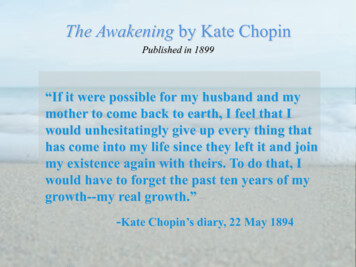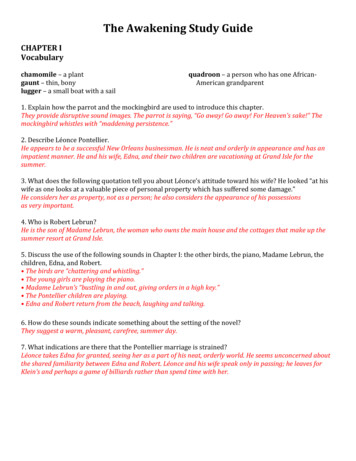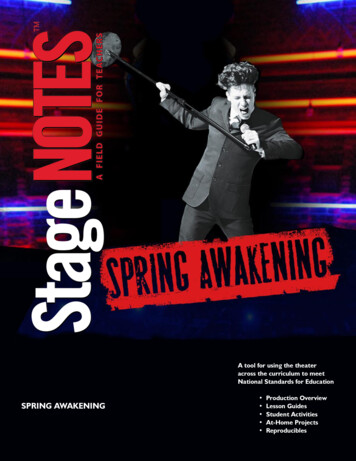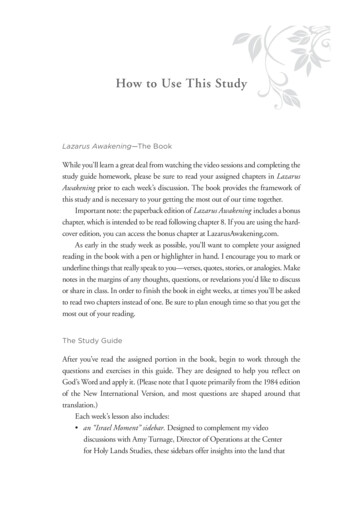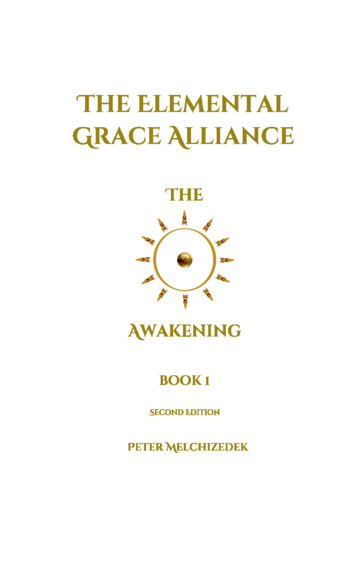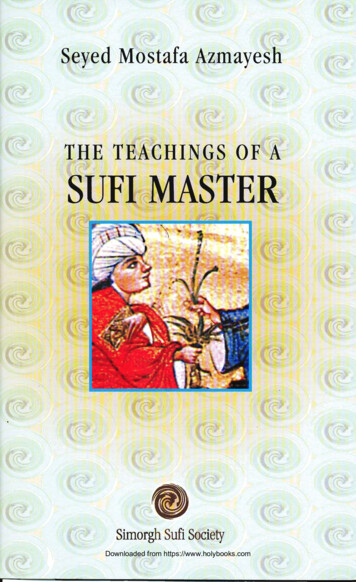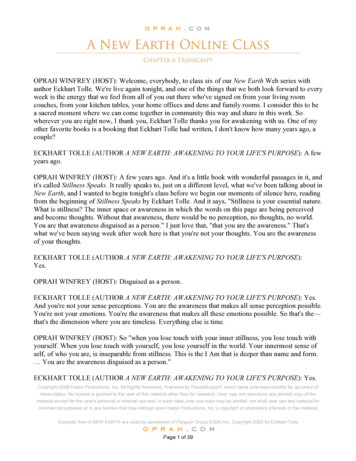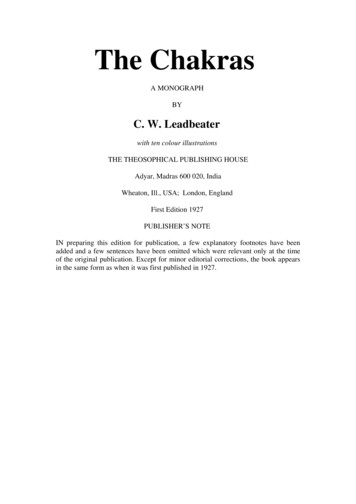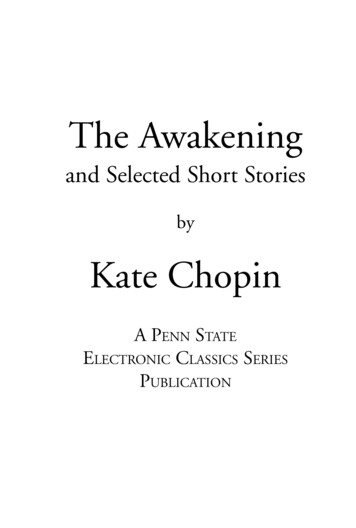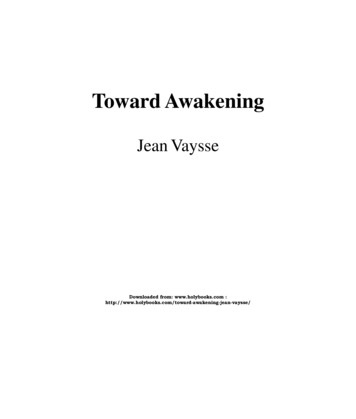
Transcription
Toward AwakeningJean VaysseDownloaded from: www.holybooks.com ysse/
CONTENTSINTRODUCTION. 3QUESTIONS . 6INNER LIFE AND OUTER LIFE: AN OVERVIEW . 8THE MEANING Of SELF-STUDY . 16RIGHT OBSERVATION OF ONESELF . 19A SIMPLE OVERALL VIEW OF THE STRUCTUREOF MAN . 23THE CONDITIONS, MEANS AND SIGNIFICANCEOF REAL SELF-OBSERVATION . 32STATES OF PRESENCE . 48CENTERS AND FUNCTIONS . 67ESSENCE AND PERSONALITY .110AWAKENING TO ONESELF AND OBSTACLES TOAWAKENING .131THE FIRST STEP IN SELF-STUDY:INNER QUIET, RELAXATION, SENSATION OFONESELF,AND THE ATTEMPTDownloaded from: www.holybooks.com :TO REMEMBER ng-jean-vaysse/
Page 3INTRODUCTIONTHE ideas we shall deal with here represent only one aspect of the teaching transmitted during hislife by G. I. Gurdjieff. They acquire their real sense only as one of the elements of a greater wholeupon which-for every man who recognizes its necessity-the work of inner transformation is based.These ideas were expounded, first and foremost, by Gurdjieff himself in his writings’-in the form ofhints, to be sure, yet with masterly breadth of vision. They have been echoed with remarkablefidelity in ‘In Search of the Miraculous’ by P. D.OuspenskyActually, their meaning and real importance first became apparent in the living experience whichGurdjieff provided for his students, not only by his explanations and by his direct answers to theirquestions, or by exercises corresponding to the stages of their development, but also, and aboveall, by having them participate in the tests offered by life itself.It was Jeanne de Salzmann’s achievement to preserve and transmit in all their original authenticitynot only the written part, but also the oral and practical parts, of the teaching given by Gurdjieff,which without her would surely have been lost. We owe her everything that has reached us.1. G. I. Gurdjieff, All and Everything (London: Routledge & Kegan Paul, 1950, 1963).2. P. D. Ouspensky, In Search of the Miraculous (London: Routledge & Kegan Paul, 1950). Seealso P. D. Ouspensky’s The Psychology of Man’s Possible Evolution (London: Routledge & KeganPaul, 1951). Although they deal with little more than the first stages of this teaching, reading boththese books of Ouspensky is invaluable for anyone who wishes to go deeply into these ideas.Gurdjieff’s own book provides a more complete view of the ideas, but is more difficult to approach.Downloaded from: www.holybooks.com 89012
Page 4INTRODUCTIONBrought to the Western World in this particular period, Gurdjieff’s ideas contain what is probablythe truest answer to the questions raised by the tremendous material power now in tape hands ofmodern man as he questions himself in front of the so-called “options” which its use obliges him toface.These ideas, fundamentally in accord with the traditional teachings of the Great Knowledge, makestrikingly clear the deep chasm that has opened up between what they represent and our contemporary way of living and thinking. Whoever meets them without prejudice for the first time feelstouched to the heart by a force of truth that cannot be denied, and also called on to put intoquestion all the values which until then have supported him through life.To make this first contact is often difficult, and it is here that the author wishes to make a contribution by helping to get them better known.Being the work of one man, this attempt to restate in an accessible form the main points of thisnew “doctrine of awakening” is of necessity limited. The following chapters are the written recordof a series of preliminary explanations addressed to people of different backgrounds who hadshown a desire to undertake a study of this teaching. That is why a considerable amount ofmaterial borrowed from the previously mentioned works will be found here.Some redundancy has been allowed in order that each of the following essays should constitute awhole in itself, and for this the author asks to be excused. Since words have a relative meaning,the question of language had to be taken into account. For, while the vocabulary employed byGurdjieff is very simple, the meaning of some of the words he used is not always the same as thatfinally imposed on them in other contemporary systems of ideas. Moreover, the meaning of certainwords depends on the reader’s level of understanding, and their “real” meaning may be verydifferent from their everydayDownloaded from: www.holybooks.com 89012
Page 5INTRODUCTIONusage. Words which lend themselves to confusion in one way or another are placed in quotationmarks.We realize that the general form of this book does not make for easy reading, but for variousreasons this form seems to us valid. While one may not understand at all how such ideas canappear and develop, it is obvious that a condensation of this kind is the result of a long collectivework in front of which personality can only stand aside and make way for the deeper meaning ofthe thought. By finding again and again in himself the taste of this attitude, may the reader of thesepages receive practical help in his own search for an unchangeable truth!Downloaded from: www.holybooks.com 89012
Page 6QUESTIONSIla the universe we live in, it is obvious that nothing is lost. Everything comes from somewhere and,having been changed or transformed to somfe degree, returns somewhere. Nothing which hastaken form or is alive remains immutable, and each of these changes serves life in some fashion.A human being cannot be an exception to this universal principle. Being endowed with thought, howcan a man go through life without questioning himself? and, being endowed with feeling, how canhe remain indifferent to such questioning?IIMineral, vegetable, animal, human, each kingdom or genus of life on our planet is the bearer of aspecific quality which characterizes it and which, within a certain range of variation, it has themission to develop. Being endowed with thought, is a man not bound to ask himself what is thespecific characteristic of human life, which human life alone can develop? One day, should hearrive at an answer which seems valid, can a man worthy of the name have any other aim than totry to nourish from then on, by all available means, this quality proper to him and his brothers?IllOnce a man has realized that he ought to get to the root of things, and that he can no longer becontent with living in accordance with the demands of the ordinary world, then a question arisesabout what he himself is and about the meaning of his own life. In the beginning, the way hesearches and the way he puts this question to himself can take very differentDownloaded from: www.holybooks.com 89012
Page 7QUESTIONSforms. But finally, beyond the partial aspects, which appear at first to be the only ones, does not allsearch in this field come to be seen as one—that of knowing, behind appearances, what is true?And, in the end, is not every man who asks himself this question, definitely and essentially a seekerof the truth?Downloaded from: www.holybooks.com 89012
Page 8INNER LIFE AND OUTER LIFEAN OVERVIEWMANY indications, which impartial observation can soon transform into conviction, lead us to feelthat there are two natures in us. One of them is personal or individual, is relatively accessible toour usual means of perception, and is both organic and psychic (or animal and animated). Theother, much less easy to perceive, is experienced as our participation in something far greater thanthe individual. Thus we call it spiritual, even universal; and, in fact, we hardly know how to speakabout it. The attention paid to it varies a great deal from person to person and at different moments of life: almost everybody, however, will recognize that, at least at certain moments, he hasfelt, alongside an egocentric, selfish tendency, this need for something infinite or “absolute.”From the moment a man turns toward himself like this, questions himself, and struggles to understand both what he is and what he could be, it becomes clear that he can turn in either of two waysand have two kinds of so-called “activities,” two kinds of life going in different directions. One isentirely oriented toward the outside, and is centered chiefly on the efficiency, usefulness andproductivity of “the individual” within the framework of his society. This is the way of living thatwestern civilization has developed: in order to succeed each member pursues years of education,character development, apprenticeship, study, specialization, “recycling,” etc., and the resultingeffectiveness in outer life is the main value by which he is classified. The other way to turn, theother kind of “activity,” concerns the inner life: it is centered above all on the “realization” of thelatent possibilities contained within the individual. It develops the faculties and qualities characteristicDownloaded from: www.holybooks.com 89012
Page 9INNER LIFE AND OUTER LIFEof his human nature, and hence the accession to (or return from) levels of life or worlds of whichouter life has no suspicion. This way of living, while very little known in western civilization, is whathas been specially developed in certain strata of Oriental civilizations. FOE those who take it up,its development demands even more time and care, more learning, research and methodicalstudies, than are required by outer life.These two lands of life can seem contradictory at first, and, indeed, in a certain way, they are. Itis obvious how-ever, that each corresponds to one of our natures, and that a complete man mustlive both at the same time: they are his human nature, which thus includes within itself a permanentcontradiction.Those great teachings and traditional ways which have remained complete and have not forgotteneither of the two aspects of man tell us, each in its own way, that these two natures show that manbelongs to two great currents of equal importance, which flow through the existing universe andassure its equilibrium. One is the current of creation which, originating tram the highest level; flowsinto diverse forms of manifestation and, in this sense, is an involutionary movement. The other isthe current that may be called “spiritualizing”;for, issuing from manifested forms, it returns to die source (to “God”) and is thus anevolutionary current. By virtue of his dual nature and the two facets of his life, manbelongs to both currents (he has “his feet on earth and his head in the heavens”),and he is one of the bridges, one of the levels at which exchange tales place, a“mediator” between the two. Could it be that this “mediating”—which can prevent himfrom being lost in one current or the other—is a measure of his growth while at thesame time it gives him his third aspect?What matters to us chiefly at this point, placed as we are solely, or almost solely, inthe outer life, is that we Sknow, or think we know, one of these two natures: that bywhich weDownloaded from: www.holybooks.com 89012
Page 10INNER LIFE AND OUTER LIFElive daily, our ordinary nature. Life calls to it incessantly and it always responds. The other natureis hidden behind it, more and more forgotten: at first, its life is displaced and slowed down; later,it is submerged and drowned in the unconscious, and finally lost. So far as it is not too deeplyburied, this other nature springs up unexpectedly now and then in moments of lucidity. Suddenlywe are forced (usually at difficult times) to recognize it without knowing where it comes from.Compared with what we ordinarily are, these moments have such a special flavor for us that theydo not leave us altogether in peace; we retain an aftertaste of our inadequacy and an uneasyconscience, aware that we are not what we ought to be. But we have no need at all of suchmoments in order to live, and, if we want to feel comfortable again, we have only to forget them-whichwe are all the more prone to do because everything around us is so arranged as to encourage thisforgetting. However, if a man wants to be fully himself one day, the re-establishment of the lostbalance between his two natures and his two ways of living is certainly the first work which isnecessary. This is why all that follows is addressed only to those who are attentive to thesespecial moments, and, wishing to be clearer about what they stand for, accept the ensuing discomfort in their lives. Inner evolution and the work that it requires cannot be carried out effectivelyunless set in motion by a genuine awareness of our inadequacies and faults (Gurdjieff used to say,our nothingness). Along with this comes the discomfort inherent in the resurgence within us of oursecond nature which was neglected or forgotten in our upbringing, and for the inner contradictionsand conflicts which this resurgence engenders. Nothing is ever given free to accept this inevitablediscomfort is the first payment mars must make when he sets out in search of himself.In this search there is perhaps a risk of oscillating between an imbecilic bliss (which would bedeliberately ignoring the discomfort) and a kind of masochism (giving it undueDownloaded from: www.holybooks.com 89012
Page 11INNER LIFE AND OUTER LIFEImportance has it not been called by seine, metaphysical anguish?). The only right attitude, adifficult one to be sure, is somewhere between the recognition of the precise nature of our uneasiness and our inner conflict, such as they are, in the hope of resolving them.Obviously such a hope and such an undertaking are conceivable only if we have the data in front ofus. This is why the question of what we are in reality, in each of our two natures, as in all thatdepends on them, appears from the first as the most fundamental question of all. For a man whowishes to be wholly himself one day, the search for the truth of what he is is the most urgentnecessity. It is this search which leads to that knowledge of oneself with which all traditionalschools are concerned.That knowledge, furthermore, cannot be limited to knowledge of oneself. How can individualityassume its full meaning unless it is re-situated in its general context? Wan participates in thetotality of life on earth: he is one of its elements, perhaps the principal one, and the study of itsmeaning is inseparable from the study of himself. Moreover, the life on earth in which man participates is itself only one step, at one level, which has its place and its role in the exchange of forceswithin the solar system to which the earth belongs. This solar system again is only one amongmany others; and, finally, in order to be complete, the study of man, the study of oneself, has to beplaced within a general cosmic perspective.Man is such a complex being that he can be studied in very different ways, which take into accountmore or less adequately his structure and the relationships between his different parts. The mostcomplete and the most useful view for the search we are undertaking considers that his organicbody, the only one immediately and directly accessible, is made up of a number of different organic and “psychological” functions, and that these are directed by centers which give to the basicvital energy the specific force proper to each function. The organicDownloaded from: www.holybooks.com 89012
Page 12INNER LIFE AND OUTER LIFEbody consists of a combination of individual qualities. Some of these are inborn and togetherconstitute the basic initial aspect of each man. They can therefore be called his essence. The restare a collection of acquired characteristics superimposed by the environment during the course oflife. Because of this added-on character (put on like a theatrical mask persona), they can be calledhis personality. Actually, this so-called personality, the form in which a man’s various elements aregrouped together, is constructed in each man around as few as two or three or even around onlyone fundamental feature of his essence, thus giving a particular flavor to everything that is crystallized in his person. Also, each man’s personality is structured in a different way, more or lessstereotyped by the different situations with which the environment habitually confronts him. Thus,in the course of his life, one man acquires many personal qualities, many personages, many “I’s”(because each, speaking for itself independently of the others, says “I,” “me,” when it appears.In addition to this organic life, a man participates in other levels of life which are less immediatelyaccessible: a psychic (or rather animated life, no doubt also a spiritual life, acid perhaps stillothers, each having its own basis, faculties and function in him. Man also passes through variousstates; sleep, dreaming, waking, and sometimes moments of a much greater “opening” tolife-moments of awakening to beauty, to harmony and to a need for the infinite, which are in fact,without his knowing it, moments of awakening to his inner being. A man sees these various statescoming and going in himself in a more or less haphazard way and often they escape him altogether. In the midst of all this, certain things develop in us. We make up our own ideas andfantasies about ourselves and the world we live in. We have a sensitivity, desires and emotionswhich color our lives in a style peculiar to us. We have our own particular ways of behaving in ourouter as in our inner life. But without doubt, the most fundamentalDownloaded from: www.holybooks.com 89012
Page 13INNER LIFE AND OUTER LIFEcharacteristic, although at the same time the least apparent-it has to be looked for in order to findit-is the incredible mechanicalness of the whole thing. Through a combination of habits, automaticreactions and conditionings established by repetition in the course of life, it is all self-sustaining andvery soon encloses itself within limits from which it no longer emerges.Nevertheless, we have in ourselves at certain moments an intuition that something else is possible-anindestructible inner freedom, a harmonious unity, and participation in the life of a “better” world.Certain myths, certain forms of art, the traditions and religions are influences which seem to comefrom “somewhere else,” touch us sometimes in the midst of our ordinary life and revive this intuition. Indeed, these influences bring us an impression of inner opening, an opportunity to awaken,and if we are attentive to it, we can recognize that something in ourselves responds-a religiousfeeling or an inner “spiritual” sense, which we feel uplifts us. In this way, there can be developed incertain people a special, almost magnetic sensitivity and attraction to everything that can lead inthis direction. More and more clearly the question arises: would it not be possible to give my life aquality other than that which I ordinarily see in it-that very quality that I glimpse only in moments of“awakening”?Writings and books tell us about this. They speak of an inner life possible for man, and of atransformation culminating in a “realization” which is called by different names according to thedifferent paths. They speak of higher bodies with a life, faculties and development of their own;they speak of the self-real or unreal-of its evolution, of going beyond it. Everything could be foundin books if we were able to understand them.But all this accumulated information, these experiences and the con
Toward Awakening Jean Vaysse Downloaded from: www.holybooks.com : . We realize that the general form of this book does not make for easy reading, but for various reasons this form seems to us valid. While one may not understand at all how such ideas can appear and develop, it is obvious tha
